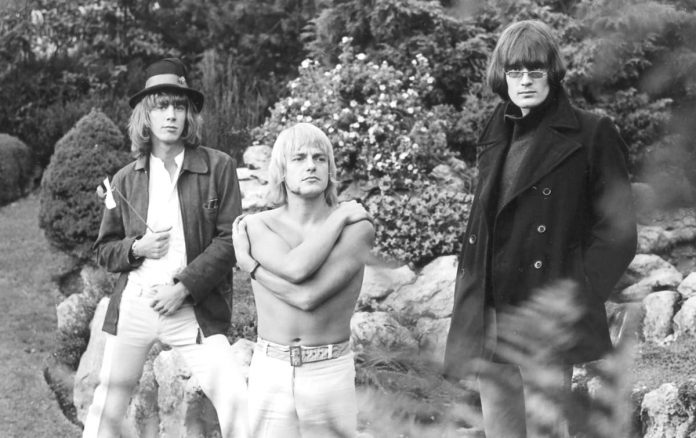
Pop music had a chance to prove it had grown up and become ‘respectable’ when The Soft Machine (Mike Ratledge – keyboards, Hugh Hopper – bass guitar, Robert Wyatt – drums, and Elton Dean – saxophones) played at the Proms recently.
It was not one of those pretentious fusion affairs of a group playing with a symphony orchestra, which seem to be as fashionable and as fruitless as similar attempts in jazz a decade ago, but an exciting juxtapositioning of some of the more recent developments in both pop and classical fields. The group played to an appreciative full house, comprising regular Promenaders and rock fans.
The Softs performance began with the playing of a tape loop of an organ, during which the group came on the platform, plugged in and tuned up. This preamble gradually envolved into the performance proper, as the tape loop took on the role of backing riff. It was thus impossible to define the point at which the music ‘began’.
Such a procedure can help one to ‘get into’ the music. Instead of it being framed by a definite beginning and end between which the audience looks on from outside (analagous to the act of playing a record) the sounds became part of the environment as they steal in behind, merge with, and gradually take over from interval chat.
The band was soon pounding out punchy phrases which shifted among various time signatures, often irregular (five, seven and eleven-four were all used). The playing was excellent, though – possibly because of the unusual metres – a little stiff. It would have been nice to have heard the Machine stretch out a little more on a straight four-four. The constant ebb and flow of the music made it impossible to be bored, yet I found their approach slightly restricting. It was a compromise between the continuously evolving melodic line of an improviser like Ornette Coleman, and Mike Westbrook’s method of using a constantly repeated phrase as a framework for a soloist. The music moved too slowly to be the flood of improvised melody of the former, and did not stay on one riff long enough to give a soloist a chance to open up as in the latter technique.
The group is loud (though not too loud) and has a great deal of drive – a pity that Hopper’s bass playing was reduced to a dull thud by the Albert Hall’s acoustics. Some of the best music came when Elton Dean was given a chance to extend himself (this was no surprise to those of us who have heard him play with Keith Tippett and Graham Collier), and a wordless vocal by drummer Wyatt provided a looser feeling – a rare moment of inspired abandon.
All the Soft Machine members have considerable technique, and their overall concept is bold and creative. One can be critical of details, though the essence of what they are doing is very worthwhile. That the concert was an overwhelming success apparently means that there will be more events of a similar nature at future Prom seasons – how about a Jazz Prom, Mr Glock? An evening with the John Surman Trio or a commissioned work from Mike Gibbs could be some of the best investments the BBC could make.















